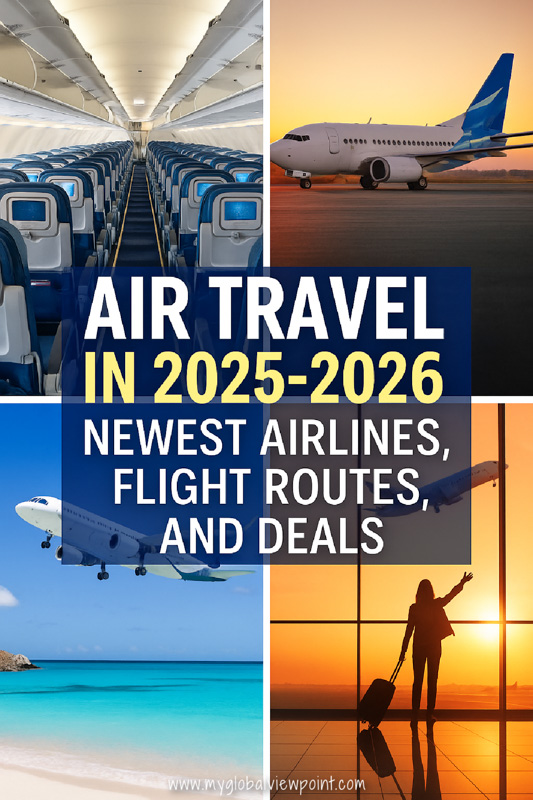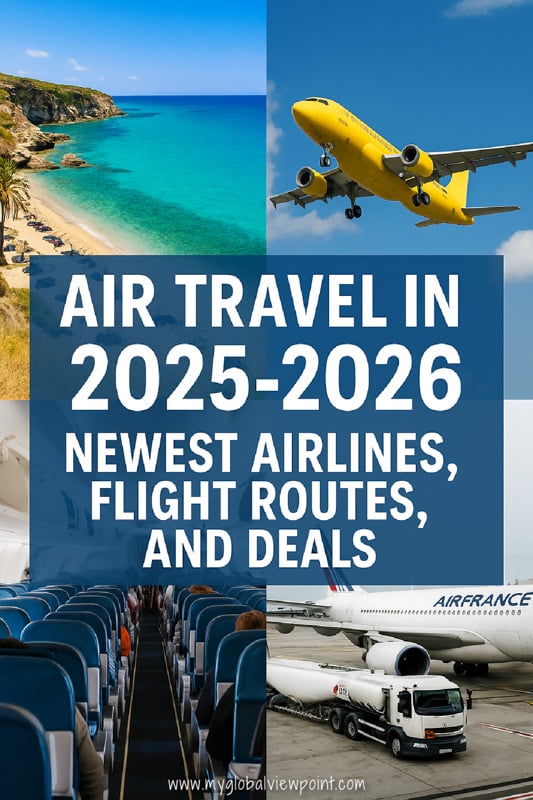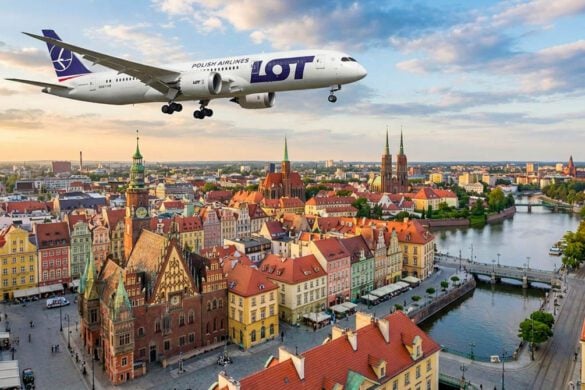As we rocket into 2025, the aviation world is buzzing with more exciting developments than I’ve seen in years. We’re talking about Saudi Arabia’s most ambitious airline launch ever, electric aircraft finally taking flight, and United Airlines deciding to fly to places like Mongolia and Greenland (yes, really).
From airlines that literally don’t exist yet but have billions in backing to sustainable aviation actually happening, this year is shaping up to be absolutely massive for travelers. I’ve been tracking all the latest developments, and honestly, some of these announcements caught me completely off guard.
- My Pro Tip: I HIGHLY recommend signing up for Going.com (formerly Scott’s Cheap Flights. This year alone, I’ve flown to Europe roundtrip for under $300 thanks to their free email alerts. The premium and elite versions are even better!
Riyadh Air Finally Takes Flight in 2025
Riyadh Air is officially launching in mid-2025, and this isn’t your typical startup airline. Backed by Saudi Arabia’s Public Investment Fund with basically unlimited money, they’re planning to serve 100 destinations within five years.
I’ve been following this story since they first announced it, and the scale is honestly insane. They’ve already ordered 39 Boeing 787-9 Dreamliners plus 60 Airbus A321neos, with options for way more aircraft. They just added 25 Airbus A350-1000s to the mix for ultra-long-haul routes.
CEO Tony Douglas says they’ll start with three aircraft flying to European capitals, then build the network from there. The strategy is smart…they’re not trying to be a super-connector like Emirates or Qatar Airways. Instead, they’re focusing on getting Saudi Arabia better connected to the world.
What’s really wild is their digital-first approach. They want booking a flight to feel like buying something on Amazon, and they’ve even recorded their “sonic brand” at Abbey Road Studios. That’s some serious attention to detail.
India Gets Three New Airlines in 2025
India is having a moment with three new airlines launching this year. Shankh Air will be Uttar Pradesh’s first scheduled full-service airline, operating from the new Noida Jewar International Airport. They’ve got $50 million in initial funding and plan to expand to international routes by 2027.
Down south, Kerala is getting two new carriers. Air Kerala is positioning itself as India’s first ultra-low-cost carrier, starting with ATR 72-600 turboprops and targeting Gulf routes by 2026. Alhind Air is also launching from Calicut, creating some serious competition in the region.
What’s interesting is how these airlines are targeting underserved regional routes first before going international. It’s a smart strategy in a market where two carriers handle over 90% of passengers.
Global Airlines Struggles After High-Profile Launch
Remember Global Airlines from my 2024 post? Well, things didn’t go as planned. They operated their first flight from Glasgow to New York in May 2025, but the response was pretty mixed.
Now there are reports that Saudi investors might take a stake in the company, which could completely change their business model from scheduled flights to aircraft leasing. It’s a reminder that starting an airline is incredibly tough, even with all the hype and A380s.
My take: Launching an airline is brutal, even with fanfare and jumbo jets. Unless Global secures more backing and finds a niche, they risk being remembered as more hype than substance.
- Read next: My Top International Travel Tips in 2025

Electric Aircraft Actually Taking Flight
This is where things get really exciting. Heart Aerospace is about to make history with the largest electric aircraft ever flown. Their Heart X1 demonstrator will take off from Plattsburgh International Airport early in 2025, paving the way for their 30-seat ES-30 commercial aircraft launching in 2028.
I’ve been skeptical about electric aviation for years, but the progress is actually impressive. United Airlines has already ordered 100 of Heart’s 19-seat aircraft for 2026, planning to use them on short hops from hubs like Chicago and San Francisco. Cape Air is getting Israel’s Eviation Alice nine-seater next year. The range limitations are real (we’re talking 200-400 kilometers for now) but for regional routes, this could be a game-changer. Lower operating costs and zero emissions? Sign me up.
United Airlines Goes Completely Off-Script
United’s 2025 expansion is hands-down the most adventurous I’ve ever seen from a US airline. They’re launching service to Mongolia, Greenland, Senegal, and Taiwan…places no other US carrier serves.
✈️ My #1 Hack for Cheap 2026 Flights:
It’s January, so flight prices are climbing fast—but you don't have to pay them. I’m currently seeing roundtrips to Europe for under $300 (deals you won’t find on Google Flights).
Step 1: Join Going.com's Free Plan here. It takes 10 seconds and requires no credit card.
Step 2: If you're doing a big trip this year, grab the 14-day free trial of Premium. You can even use my code JON25 for 25% off.
Seriously, this is the single best money-saving tool I’ve used in 8+ years.
👉 Send me cheap 2026 flightsStarting June 14, you can actually fly nonstop from Newark to Nuuk, Greenland on a Boeing 737 MAX 8. It’s only a four-hour flight, but honestly, I never thought I’d see the day. From Tokyo, they’re flying to Ulaanbaatar, Mongolia three times a week starting May 1.
Patrick Quayle, United’s network planning VP, says they’re trying to add “experiences” rather than just traditional business destinations. It’s working…their Cape Town route has been a huge success despite seeming crazy when they first announced it.
The Taiwan route to Kaohsiung is particularly smart, complementing their existing Taipei service and giving easy one-stop access from the US.
- For further reading: The Most Beautiful Places in Greenland
- You may also like: The Top Airlines That Fly to Taiwan
- Read after: Mongolia Bucket List Locations You Need to See

Heart Aerospace Pushes Electric Aviation Forward
Heart Aerospace unveiled their full-scale demonstrator, the Heart X1, which will test all the technology for their upcoming 30-passenger ES-30 aircraft. This isn’t just some concept – it’s a real airplane that’s about to fly.
The company received a $4.1 million grant from the FAA’s Fuelling Aviation’s Sustainable Transition (FAST) program to develop their hybrid-electric propulsion management system. With a 200-kilometer all-electric range and 400-kilometer hybrid range, the ES-30 could revolutionize short-haul routes.
What I love about Heart’s approach is they’re being realistic. They know electric aviation has limitations, so they’re building hybrid systems that can extend range when needed. It’s practical engineering, not just environmental marketing.
New Routes That Actually Matter
Beyond the headline-grabbing destinations, airlines are adding routes that’ll make a real difference for travelers. Delta is launching Seattle to Rome and Barcelona in May 2026, going head-to-head with Alaska Airlines.
United’s expansion includes unique routes like Washington Dulles to Senegal, making them the US airline with the most African destinations. They’re also connecting more dots in the Pacific with additional Palau service from Tokyo. What’s smart about these additions is how they fill genuine gaps in the network rather than just adding more competition on existing routes.
- Read next: My Guide to Flying Delta One in 2025
Sustainable Aviation Gets Real Investment
The electric aircraft movement is getting serious backing. The commercial electric aircraft market is seeing strategic partnerships between aerospace giants and battery technology companies. Companies like ZeroAvia are making progress with hydrogen-electric aircraft, while Airbus is developing hybrid-hydrogen planes for 2035.
Air New Zealand has pre-ordered up to 23 Eviation Alice aircraft and plans to deploy electric cargo planes for mail delivery starting in 2026. When a major international airline makes those kinds of commitments, you know the technology is getting close to prime time.
The Airbus A321XLR Revolution Begins
The biggest aircraft story of 2025 isn’t about some futuristic concept – it’s happening right now. Iberia launched the world’s first Airbus A321XLR commercial flights in November 2024, flying from Madrid to Boston. This narrow-body plane can fly 4,700 nautical miles, opening up routes that were never economically viable before.
Wizz Air started using the A321XLR for flights from London Gatwick to Jeddah, Saudi Arabia in March 2025…that’s a 2,927-mile route on a single-aisle plane. Aer Lingus launched Dublin to Nashville service in April, and they’re adding Indianapolis flights in May.
What makes this so exciting is that these airlines can now serve “thin” routes that don’t have enough demand for a wide-body aircraft. American Airlines is getting 50 A321XLRs and plans to use them for new routes to secondary cities across Spain, Portugal, and Scandinavia by summer 2026. United expects their first XLRs in December 2025.
I think this is going to completely change how we think about long-haul travel. Instead of everything going through mega-hubs, we’ll see more point-to-point routes between smaller cities.
Southwest Airlines Finally Goes International
This one caught me completely off guard. Southwest Airlines – the airline that has never partnered with anyone internationally – launched its first international partnership with Icelandair in February 2025.
You can now book itineraries that connect Southwest’s domestic network to Iceland and beyond through Baltimore, Nashville, and Denver. Starting this summer, they’re adding Orlando, Pittsburgh, and Raleigh-Durham as connection points.
What’s really wild is that Southwest is planning at least one more international partnership in 2025, and they’re talking about eventual Rapid Rewards point redemptions on partner flights. They also announced a partnership with China Airlines for West Coast connections.
This is honestly the biggest strategy shift I’ve seen from Southwest in decades. They’re completely changing their business model to compete with the major carriers.


The Big Picture for Air Travelers
The big picture here is that 2025-2026 represents a genuine shift in aviation. We’re seeing airlines take bigger risks on unusual destinations, sustainable technology finally becoming commercial reality, and new carriers with serious backing entering the market.
For travelers, this means more options and potentially lower costs as competition increases. The electric aircraft development could eventually make regional travel much cheaper and more accessible. I’m personally most excited about United’s off-the-beaten-path expansion and the progress on electric aviation. After years of incremental changes, it feels like we’re finally seeing some real innovation in commercial aviation.
Global Viewpoint is a personal blog. All content is for informational and entertainment purposes only and does not constitute professional financial, medical, or legal advice.





